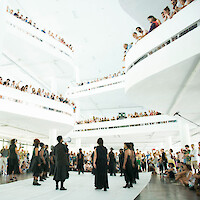Situating the São Paulo Biennial 2020-21
Round table discussion with Michael Asbury (Chelsea College of Arts, UAL), Jacopo Crivelli Visconti and Paulo Miyada (Chief and adjunct curators) Carla Zaccagnini, Francesco Stocchi, Ruth Estevez and Elvira Dyangani Ose (Curatorial team)
Date
Friday, June 25
Time
12:00–12:40pm CEST / 6:00–6:40pm HKT
Location
Zoom
Registration
All talks are open to public. This registration link gives access to all three days.
Please register at the Zoom Webinar HERE
Description
Under the theme, ‘Though its dark, still I sing’, the organisers of the 2020 edition, could not have imagined how prophetic their title would prove to be. The pronouncement that the event would think “about the work of art as something permeable to the relationship it establishes with its surroundings, rather than as something crystallised” would indeed be put to the test. As the curatorial team itself claimed:
The ideas of the rehearsal and of the open rehearsal, central to the methodology used for the conception and construction of this Biennial, were put to the test throughout these months of work. The adjustments and changes, which are now being multiplied due to the Covid-19 pandemic, are an integral and relevant part of the process of insistence, transformation and fine tuning that has gone into the design of the 34th Biennial.
This panel discussion will focus on how the curatorial team has had to adapt to a fast-changing environment and maintain a programme that, on the one hand, became far more locally driven in terms of ‘live’ audience participation while, on the other hand, almost entirely virtual in terms of its regular international professional attendees.
About the Speaker
Dr Michael Asbury is Reader in the History and Theory of Art and Deputy Director of the research centre for Transnational Art, Identity and Nation (TrAIN). An internationally recognised specialist in modern and contemporary art from Brazil, he has published extensively and has curated numerous exhibitions in the UK, Europe and Latin America.
Michael's practice questions art historical assumptions that both constitute and privilege the so-called Western canon. Methodologically located within decolonial and post-colonial perspectives, it focuses as much on genealogical constructions as it does on individual artistic trajectories. The transnational in this sense is considered through the articulation of artistic and curatorial agency and institutional critique.
More about Michael Asbury
